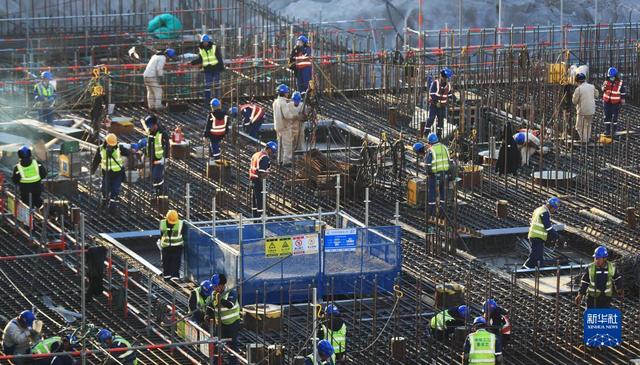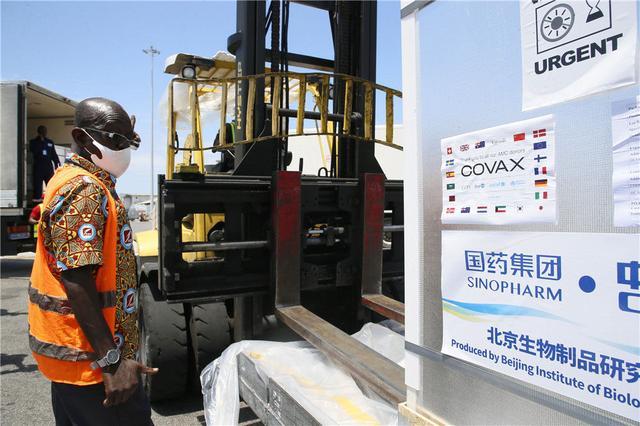Chinese diplomacy aids development across the world


Global vision, initiatives
While attending the general debate of the 76th Session of the UN General Assembly in September via video link, Xi officially put forth the Global Development Initiative, which is aimed at enhancing all people's well-being and realizing all-around human development.
The initiative has so far received endorsement and support from UN agencies and many other international organizations, together with some 100 countries, according to Wang.
In an October phone conversation with Teodoro Obiang Nguema Mbasogo, president of Equatorial Guinea, Xi said China welcomes the African country joining the initiative. He added that China stands ready to work with Equatorial Guinea and other African countries to promote the sustainable and common development of developing countries.
On many occasions-including the Boao Forum for Asia, the World Economic Forum and the China International Import Expo-Xi announced a string of new measures, such as a shorter negative list, a more business-friendly environment and greater institutional opening-up to open wider to the world and share China's development opportunities with other countries.
China also actively supported and promoted the implementation of the Regional Comprehensive Economic Partnership, which came into force at the start of this year.
The partnership is the world's most promising free trade area serving the largest number of people.
"Through the initiatives, proposals and ideas, the world can see that China is a major country that fulfills its responsibilities and honors its promises with a global vision," Yu said.

Voice heard by the world
Zhao Suisheng, a professor at the University of Denver's Josef Korbel School of International Studies and director of its Center for China-US Cooperation, said keeping diplomacy virtual has not disadvantaged, but even intensified Xi's international engagement and his foreign policy agenda over the past year.
Zhao said that as China has become the world's second-largest economy and cannot be ignored, the world attaches high importance to the country's foreign policy, its concerns and positions, as well as its solutions for international issues and proposals for reform of the global governance system.
In recent years, particularly since the 18th National Congress of the Communist Party of China in 2012, the country has made its voice on these issues loud, clear and consistent, Zhao said.
For example, China has rejected the concept of the "rules-based order" defined and imposed on others by the US and other Western countries.
It has unequivocally pointed out that in today's world there is but one international system, with the UN at its core; there is but one international order, underpinned by international law; and there is but one set of rules-i.e. the basic norms of international relations underpinned by the UN Charter.
"Head-of-state diplomacy is an important and irreplaceable way to make China's voice heard by the international community, because such high-level interactions usually discuss a wide range of strategic topics," Zhao said.
Since the US and its allies made a hasty withdrawal from Afghanistan, China has provided emergency humanitarian assistance to the war-torn country and supported it in preventing chaos, maintaining stability, fighting terrorism, ending violence, and developing in the right direction.
Xi has elaborated China's position on this issue during his interactions with other foreign leaders, stressing that the international community should create a favorable external environment for the peaceful reconstruction of Afghanistan, a neighboring country.
In September, Xi attended a joint summit of the leaders of the Shanghai Cooperation Organization and the Collective Security Treaty Organization member states on the Afghanistan issue.
At the meeting, he made a three-point proposal that called for efforts to promote a steady transition of the situation in Afghanistan as soon as possible, engage the country in dialogue and help tide the Afghan people over difficulties.
"As Xi has said, China has always been a builder of world peace, a contributor to global development and a defender of the international order," said Ruan Zongze, executive vice-president of the China Institute of International Studies.
"While China has managed its own affairs well over the past year, it has also tried its best to help other countries and to jointly address challenges faced by the whole of mankind as a responsible major country."

Strong determination
Observers said China's diplomacy last year showed strong determination in defending national sovereignty, security and dignity when faced with external interference and provocations.
As Wang said at the symposium, the Chinese foreign service over the past year has lived up to the expectations of the people, fulfilled its mission, and rebuffed all sorts of infringements and bullying. That has demonstrated the self-confidence, self-reliance and perseverance of the Chinese people, and the ambition, determination and integrity of the Chinese nation.
Yu, from CIIS, said, "Through Xi's frequent phone calls and virtual meetings with foreign leaders, China has actively pushed forward cooperation in all fields with other countries and promoted the building of a new type of international relations featuring mutual respect, fairness and justice, and win-win cooperation.
"This is in sharp contrast to certain countries that have reverted to the Cold War mentality, flared up divides and conflicts, and created bloc confrontations," he said.
Last month, China restored diplomatic relations with Nicaragua, raising the number of countries engaged in diplomatic relations with China to 181 and further consolidating the international consensus on the one-China policy.
According to Wang, China has promoted overall steady growth of its relations with other major countries in the face of the profound evolution of the international landscape last year.
China and the US have explored a new mode of interaction based on mutual respect and equality, he said.
Zhao, with the University of Denver, said some people in the US who believe that conflicts are unavoidable between the US and China were very surprised by the phone calls and the virtual meeting between Biden and Xi at critical moments.
"Even though various problems exist, it is inconceivable for the two countries to cease exchanges and cooperation, because there are too many shared interests and too much prosperity at stake. I think the Chinese leader has a very clear view on this point," he said.
The joint declaration on enhancing climate action, released by the two countries at the 26th session of the Conference of the Parties to the UN Framework Convention on Climate Change, was a good example, Zhao added.
In the meantime, he said China also made clear its bottom lines on issues concerning its core interests when interacting with the US and has firmly held those lines.
During a virtual meeting with Biden in November, Xi said the new wave of tensions across the Taiwan Straits was because of repeated attempts by the Taiwan "authorities" to look for US support for their independence agenda as well as the intentions of some people in the US to use Taiwan to contain China.
He clearly stated that China will be compelled to take resolute measures should the "Taiwan independence" separatist forces "provoke us, force our hands or even cross the red line".
Sino-EU relations
During the past year, China and the European Union have overcome challenges and made new progress in their comprehensive strategic partnership, Wang said.
When speaking with Charles Michel, president of the European Council, in a phone call in October, Xi stressed that given the differences between China and the EU in history, culture, social system and stage of development, it is not surprising that there are issues about some competition, divergences and differences.
But those issues should be resolved through dialogue and negotiation, he added.
Xi said that China is always sincere in developing China-EU relations, but at the same time will resolutely safeguard its own sovereignty, security and development interests.
Wang said that over the past year, China's diplomacy has forged ahead in a volatile international environment, maintained composure and confidence in major-power interactions and scored a succession of hard-won achievements.
And all this has been made possible by Xi's strong leadership and the clear guidance of Xi Jinping Thought on Diplomacy, he said.

































